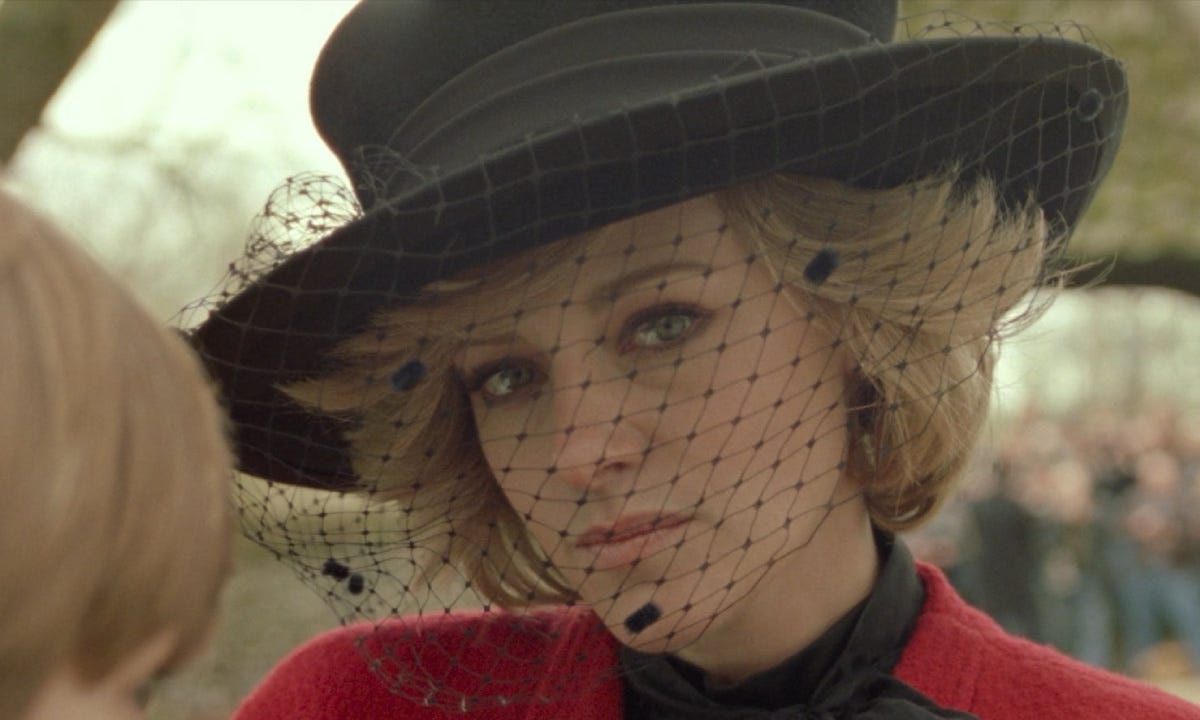Spencer
Kristen Stewart is vulnerable and resilient in this portrait of Princess Diana and her ostracism from the royal family.
Please support Film Yap by signing up for a subscription for access to premium content plus exclusive opportunities — now at a huge discount!
“Spencer” is probably not the movie most people will expect, as it is not a standard film biopic of Princess Diana of Wales. It’s deliberately paced and does not so much get into her interactions with the rest of the royal family, spending most of the movie in solitary anguish. So if you’re expecting something like “The Crown” with lots of biting exchanges of dialogue, this isn’t that.
The emcee at the Heartland Film Festival screening introduced it as something more akin to “Black Swan,” if that gives you any sort of flavor.
This is less an ensemble and more a one-woman character study, with Kristen Stewart commanding the screen as Diana, a woman who very much felt she had no control over her own life. The story (screenplay by Steven Knight) takes place over the course of the three-day Christmas holiday during the time she was estranged from her husband — and thereby the rest of the royals, including her two sons — but not yet formally separated.
This, then, is the tale of a trapped woman who finally gathers the strength to demand her freedom.
Director Pablo Larraín previously made “Jackie,” another tale of a woman much admired by also a prisoner of her circumstance, and I think the two films are very much companion pieces. Most of us might look at Diana’s wealth and privilege and wish to exchange places with her in that gilded cage.
But after witnessing the subtle but persistent mental torture — there’s no other word for it — inflicted upon Diana by the royal family and their staff, I doubt they’d still feel the same.
Queen Elizabeth (Stella Gonet) barely speaks in the film, imperiously gazing at Diana like a bird of prey gazing down upon a struggling critter and trying to decide if it’d make a good meal. Prince Charles (Jack Farthing) is distant and cold, seemingly less concerned with his wife’s wellbeing than the image she puts forward: “There has to be two of you… the real one and the one they take pictures of.”
A pair of royal servants are sympathetic and helpful: Darren (Sean Harris), the head chef, who runs his kitchen like a combination of an army regiment and a ballet troupe; and Maggie (Sally Hawkins), the royal dresser who knows Diana more intimately than anyone, body and soul. She is the one who advises Diana to resist and fight back, rather than focusing her negative energy inward.
“You are your own weapon. Don’t cut it to pieces.”
On the other, more darker side is Timothy Spall as Major Gregory, a military officer who has been brought in to ward off the press and to coral Diana into her proper pen. He’s a purely malevolent figure, lips pursed in a constant twist of disapproval, sharp eyes following her everywhere.
His main duty seems to be to get Diana to show up at the various meals and events on time and in the proper clothing — something she rarely complies with.
Indeed, much of the “story” is scenes of Diana ensconced in her room, looking over the fabulous dresses laid out for her — a different one for each meal — and refusing to put them on. She also spends a great deal of time in the lavatory, bringing up whatever previous meal that was made for her. She also sneaks out at night to stalk the royal grounds or snitch food from the pantry — little flights of rebellion.
It may not seem like much of a narrative, but over time the filmmakers ratchet up a sense of paranoia and doom around her. Imagine living in a world where your every utterance is recorded by the press or shared around the servants’ quarters, how you look is perpetually examined and judged, and your interactions with your own children are monitored and circumscribed.
All of it bound by hundreds of years of tradition and ceremony, where people live as icons rather than human beings. As Diana herself says, there is no sense of a future: “There is only one tense here — past and present are the same thing.”
There isn’t a strong resemblance between Stewart and Diana, though the hair and makeup team do yeoman’s work in suggesting one. I’m guessing the costume team will get recognition for the many intricate outfits, though the 1980s fashions still look garish to these eyes.
If I have a quibble with Stewart’s performance, it’s her tendency to utter much of her dialogue in an urgent whisper, as if Diana is trying to finish talking as soon as possible and to as few people as she can. There’s some basis for this: Diana took voice lessons following her divorce so her public speaking didn’t come across so shy and girly. Still, it makes things hard to follow at times.
If her voice fails her at times, though, Stewart’s facial expressions and body language more than make up for it. She seems to almost fold into herself, as if afraid to take up space in the physical world.
Her Diana is like a lovely flower, much windblown and stormed upon, the petals rather ragged but still holding on.
If I’m being honest, I don’t much care about the contretemps of the British royals (or their American equivalents), an antiquated legacy from a bygone world. But I very much cared about the Diana we see in “Spencer,” a woman everyone thought weak — including her, until she discovered otherwise.



